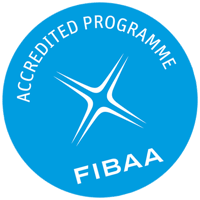BENEFIT FROM OUR MODULAR INNOVATION
THE NIT CURRICULUM - MODULAR AND INNOVATIVE
At the NIT, we reflect a modern and agile work environment through our innovative learning concepts: we do not focus on lecturing, but rather on student-learning through many dynamic, practical, and socially-integrated projects.
Modules from the areas of classical management, self-development, innovation management, company foundation, and digitalization familiarize students with the entrepreneurial challenges of the future. Topics such as ethics, law, and IT security further expand on important aspects of technology management. In addition, students can learn programming and familiarize themselves on real projects with relevant innovation methods such as design thinking.
What the curriculum is about
Blended learning concepts, modern didactics & diverse forms of examination

 General Management
General Management
ECONOMICS & LAW
This module familiarizes students with the basics of economic thinking and their relevance for the investment climate. It covers economic principles such as con- ditions for functioning markets, market failures and intervention, international trade and political economy.
Those principles are being applied to the investment climate in developing and developed countries. Security and stability of property rights, regulation and taxation, availability of financial markets, infrastructure, and labor markets are being discussed as determining aspects.
- Prof. Roee Sarel
- 6 ECTS / 180 hours
 General Management
General Management
FINANCIAL PERFORMANCE & MANAGEMENT CONTROL
Students get a basic understanding in accounting and cost accounting as well as financing and investment accounting. They learn how to analyze and apply key instruments like balance sheets, profit and loss statements and break-even analysis. This knowledge is being used to measure the performance of a com- pany, make investment decisions and evaluate projects.
In this module, students work with case studies, business games and simulations.
- Prof. Dr. Matthias Meyer
- 6 ECTS / 180 hours
 General Management
General Management
APPLIED MARKET & BUSINESS STRATEGY
In this module, students learn to develop entrepreneurial strategies in response to national and international market challenges and to analyze the consequences of strategic alternatives.
Key concepts like value proposition and strategic positioning, pricing strategies, profitability, and scenario analysis are part of this course content. Related issues such as the planning of projects for strategy implementation and management of (project) teams, risk, and stakeholder
- Dr. Philipp Glösmann
- 6 ECTS / 180 hours
 Professional Skills
Professional Skills
SHAPING THE WORLD OF TOMORROW
The module Shaping the World of Tomorrow provides students with an introduction to digital transformation (history, drivers, success factors).
They learn the basics of the development of digital products through a practical project and gain an insight into the topics of IT security as well as the ethics and culture of digital society.
The module encourages students to play an active role in shaping digital change and to be able to competently evaluate future developments.
- Prof. Dr. Riccardo Scandariato
- 6 ECTS / 180 hours
 Professional Skills
Professional Skills
SELF-DEVELOPMENT & COMMUNICATION
The Self-Development & Communication module enables participants to identify and reflect on their own values and skills
in a digital environment. Using various communication models and conflict dynamics, students develop their reflection skills and acquire the ability to further enhance their methodical and interpersonal work.
- Sabine Conow
- 6 ECTS / 180 hours
 Professional Skills
Professional Skills
LEADERSHIP IN CHANGING ENVIRONMENTS
In the Leadership in Changing En- vironments module, participants develop an understanding of the different leadership requirements in the context of changing social, economic, and technical conditions.
Personal skills dealing with decision-making processes in unpredictable and difficult-to-control situations are expanded, and the possibilities and limitations of leadership on the development of a learning and innovation culture are demonstrated.
- Prof. William Blake
- 6 ECTS / 180 hours
 Business Development
Business Development
FOUNDATIONS OF BUSINESS DEVELOPMENT
The Foundations of Business Development module teaches the basics for the development of innovative projects and new business fields.
The modules focus on recognizing, analyzing, and planning new business methods.
Subsequently, students are able to develop innovations and develop business plans.
- Port. Dr. Christoph Ihl
- 6 ECTS / 180 hours
 Business Development
Business Development
INNOVATION & NEW BUSINESS PROPOSAL
In the Innovation & New Business Proposal module, students in start-up teams develop a self-chosen business idea and validate it using various approaches. In that, they have the opportunity to work on real projects with our industry partners. They design new business models and learn how to combine existing information and innovative ideas.
- Prof. Dr. Christoph Ihl
- 6 ECTS / 180 hours
 Business Development
Business Development
INNOVATION & NEW BUSINESS PLAN
This application-oriented module aims to further develop an idea into an innovation and business concept. In addition to integrated specialist knowledge, students learn skills such as the creation of a communication plan and how to expand their personal competencies. In most cases, a detailed pitchdeck for the project is available in the end.
- Prof. Dr. Christoph Ihl
- 6 ECTS / 180 hours
 development
development
INNOVATION TOOLS, METHODS & CONCEPTS
In this module, students are familiarized with trends and current developments and can subsequently evaluate and shape them. The focus of the curriculum is on tools and processes of modern technology and innovation management such as stage gate processes, technology roadmaps, foresight tools, large data analysis or simulation. At the same time, current trends such as the circular economy, big data, and digitization will be discussed.
- Dr. Viktoria Grabe
- 6 ECTS / 180 hours
 NIT LANGUAGES
NIT LANGUAGES
NIT LANGUAGES
All NIT students learn a foreign language during their studies. German as a foreign language is compulsory for all students below level C1.
Native speakers and students above the required level can choose another language (e.g. Chinese, French, Spanish).
- 5 ECTS / 150 hours
 PRACTICALEXPERIENCE
PRACTICALEXPERIENCE
PRACTICAL EXPERIENCE
The internship gives students an opportunity to test and apply their theoretical knowledge in practice.
Working students develop an independent project in their company.
- 10 ECTS / 300 hours
 MASTER’S THESIS
MASTER’S THESIS
MASTER’S THESIS
In the Master‘s thesis, students develop a research question or develop a business idea. The thesis can be a business plan or the business field development of a corporate innovation project. The aim of the Master‘s thesis is to show that the student is in a position to independently work on a topic in Technology Management, according to scientific aspects.
- 15 ECTS / 450 hours (Over three months 8
 COMPLEMENTARY STUDIES
COMPLEMENTARY STUDIES
DATA SCIENCE AND MACHINE LEARNING FOR MANAGERS
In this module, students learn how to acquire, cleanse, and transform large amounts of data online using various techniques. The aim is to explore, visualize, and model the related data in a target-oriented way, using modern methods of machine learning.
- Prof. Dr. Christoph Ihl
- 6 ECTS / 180 hours
 Complementary Studies
Complementary Studies
LEGAL ASPECTS OF TECHNOLOGY MANAGEMENT
Come together live everyday to chat, interact and make Entertainment Together. Come together live everyday to chat, interact and make Entertainment Together.
- Monika Sekara
- 6 ECTS / 180 hours
 Complementary Studies
Complementary Studies
CODING
The Coding module enables participants to start programming. Common programming languages such as HTML, CSS, and Java are considered and evaluated. In a practical project the students learn to program web applications with JavaScript.
- Helder Pereira
- 6 ECTS / 180 hours
Some Facts About our Students
Our teacher are the best & highly qualified
Have a look at our Flying Faculty.

